This Bill will likely raise the cost of food! Atta go Trudy & Singh!!Surprise!! (Not surprised)
View attachment 20036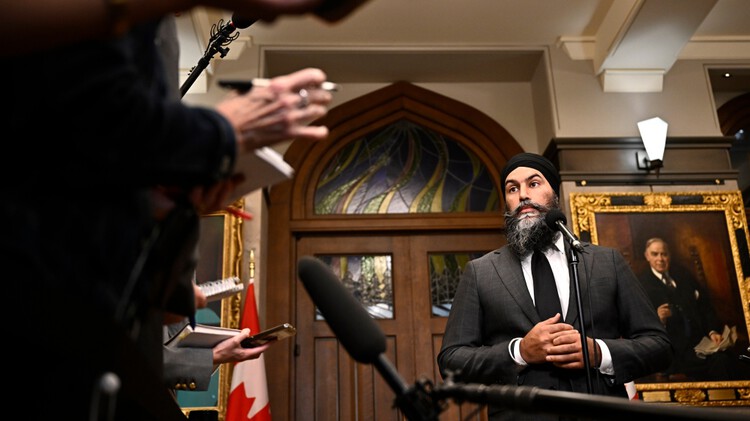
NDP agree to help pass Liberal 'affordable housing and groceries' bill in exchange for amendments — CTV News
With the parliamentary clock ticking down and the government yet to pass their 'affordable housing and groceries' bill—the first piece of federal legislation tabled in the fall sitting—the NDP have agreed to help the Liberals advance Bill C-56 in exchange for a series of amendments inspired by a...apple.news
Well, today is the Liberal/NDP Non-Coalition Coalition Budget Day!
- Thread starter Ron in Regina
- Start date
You are using an out of date browser. It may not display this or other websites correctly.
You should upgrade or use an alternative browser.
You should upgrade or use an alternative browser.
Well, ya can't say they ain't taking the obesity problem seriously.This Bill will likely raise the cost of food! Atta go Trudy & Singh!!
Youre fat by choice. Its its an FAA thing.Well, ya can't say they ain't taking the obesity problem seriously.
This is all so stupid. Raising interest rates makes the rich,(and people like me that are not rich, but are debt free) richer, while making life unaffordable for the majority. As does billions in tax money to set up plants with dubious viability. The proper thing to do is make credit harder to get and cut the cost of government.In a speech in Vancouver, the central bank’s second-in-command said that many of the economic forces that pulled down interest rates in recent decades are going into reverse. That “new normal” creates risks for indebted households, businesses and the broader financial system, which need to be managed proactively, she said.
Not true. What happens is people buy cheap food, or junk food because it is cheap. this just adds to the obesity problem and all the health care issues that go along with it.Well, ya can't say they ain't taking the obesity problem seriously.
Prime Minister Justin Trudeau said Friday that his government has “always exercised fiscal restraint,” as he prepares for the Liberals’ fall economic update next week that Conservative Leader Pierre Poilievre is saying needs to include a plan to balance the budget, as well as relief from scheduled carbon tax increases.
“I propose a compromise. No more hikes,” said Poilievre during a press conference on Friday as he made his short list of demands known ahead of the fall economic statement.
Finance Minister Chrystia Freeland is set to present next week what she promised would be a “responsible fiscal plan” which would also allow the government to “invest in what Canadians need right now.” She promised the update would focus on affordability and housing.
Poilievre blamed government spending for many of the problems afflicting Canada right now, such as record food bank usage and tent cities appearing across the country.

“(Trudeau) has added over $600 billion of inflationary debt, more debt than all prior prime ministers combined, doubling our debt. He’s flooded our economy with easy money, which has bid up the cost of the goods we buy and the interest we pay,” said Poilievre.
(deficits drive up the cost of living by pushing up inflation and interest rates. Government spending in a tight economy competes with consumers and businesses for scarce goods and services, hiking prices for everyone)
“On top of that, he’s brought any massive carbon tax on gas, heat, and everything that is transported by truck. The consequences have been devastating.” Etc…

 apple.news
apple.news
 Prime Minister Justin Trudeau has a habit of saying he’s “working to make life more affordable.”
Prime Minister Justin Trudeau has a habit of saying he’s “working to make life more affordable.”
Trudeau is set to raise his federal excise tax on alcohol again in 2024. This time by 4.7%.
Taxes in Canada already make up about half the price of beer, two-thirds of the price of wine and more than three-quarters of the price of spirits.
That means if you buy a 24-pack of pilsner, a couple bottles of Pinot and a bottle of vodka, you can expect to pay about $120. More than $75 of that is tax.
In fact, Canadians pay five times more tax on a case of beer than our friends south of the border. In Saskatchewan, Prince Edward Island, and Newfoundland and Labrador the tax on a case of beer costs more than the total price of a case in half of American states.
The feds have been bingeing on alcohol tax hikes since the 2017 budget. That year, the Trudeau government introduced an automatic tax hike escalator. That means the federal excise tax automatically increases with inflation every year on April 1.
With inflation having reached a 40-year high, Canadians are facing a steep tax hike in 2024.
When the escalator tax was first introduced, there wasn’t much of a fuss because inflation was lower. But even small tax hikes can become big bills over time. After next year’s tax hike, the federal government’s alcohol excise taxes will have increased 19% because of the automatic annual tax hike first imposed in 2017. Budget 2017, the government has increased its tax take without MPs voting on the increase. That’s fundamentally undemocratic.
Trudeau could stop next year’s tax hike with a stroke of a pen.
In last year’s budget, the feds watered down the scheduled 6.3% tax hike to 2%. It took the smallest possible stumble in the right direction.
Polling shows the rising cost of living is the single greatest economic issue facing Canadians. Any government serious about affordability would cancel the upcoming tax increase and scrap its automatic tax escalator.
Democracy requires votes on tax hikes. That’s why we have the House of Commons full of MPs who are chosen by their constituents and who take $194,000 in taxpayer-funded salaries. But the automatic tax increases that bypass our MPs are a mockery of our democratic processes.
In fact, the only time MPs were able to vote on the most recent alcohol tax increase, they overwhelmingly voted to cancel the tax hike. Trudeau simply ignored the non-binding motion and the democratic will of Parliament.

 apple.news
apple.news

“(Trudeau) has added over $600 billion of inflationary debt, more debt than all prior prime ministers combined, doubling our debt. He’s flooded our economy with easy money, which has bid up the cost of the goods we buy and the interest we pay,” said Poilievre.
(deficits drive up the cost of living by pushing up inflation and interest rates. Government spending in a tight economy competes with consumers and businesses for scarce goods and services, hiking prices for everyone)
“On top of that, he’s brought any massive carbon tax on gas, heat, and everything that is transported by truck. The consequences have been devastating.” Etc…
Trudeau says his government has 'always exercised fiscal restraint' as Poilievre pushes for balanced budget — National Post
Finance Minister Chrystia Freeland is set to present next week what she promised would be a 'responsible fiscal plan'

Trudeau is set to raise his federal excise tax on alcohol again in 2024. This time by 4.7%.
Taxes in Canada already make up about half the price of beer, two-thirds of the price of wine and more than three-quarters of the price of spirits.
That means if you buy a 24-pack of pilsner, a couple bottles of Pinot and a bottle of vodka, you can expect to pay about $120. More than $75 of that is tax.
In fact, Canadians pay five times more tax on a case of beer than our friends south of the border. In Saskatchewan, Prince Edward Island, and Newfoundland and Labrador the tax on a case of beer costs more than the total price of a case in half of American states.
The feds have been bingeing on alcohol tax hikes since the 2017 budget. That year, the Trudeau government introduced an automatic tax hike escalator. That means the federal excise tax automatically increases with inflation every year on April 1.
With inflation having reached a 40-year high, Canadians are facing a steep tax hike in 2024.
When the escalator tax was first introduced, there wasn’t much of a fuss because inflation was lower. But even small tax hikes can become big bills over time. After next year’s tax hike, the federal government’s alcohol excise taxes will have increased 19% because of the automatic annual tax hike first imposed in 2017. Budget 2017, the government has increased its tax take without MPs voting on the increase. That’s fundamentally undemocratic.
Trudeau could stop next year’s tax hike with a stroke of a pen.
In last year’s budget, the feds watered down the scheduled 6.3% tax hike to 2%. It took the smallest possible stumble in the right direction.
Polling shows the rising cost of living is the single greatest economic issue facing Canadians. Any government serious about affordability would cancel the upcoming tax increase and scrap its automatic tax escalator.
Democracy requires votes on tax hikes. That’s why we have the House of Commons full of MPs who are chosen by their constituents and who take $194,000 in taxpayer-funded salaries. But the automatic tax increases that bypass our MPs are a mockery of our democratic processes.
In fact, the only time MPs were able to vote on the most recent alcohol tax increase, they overwhelmingly voted to cancel the tax hike. Trudeau simply ignored the non-binding motion and the democratic will of Parliament.
TERRAZZANO AND BINDA: Trudeau hiking alcohol taxes again in 2024 — Toronto Sun
Any government serious about affordability would cancel the upcoming tax increase and scrap the automatic tax escalator
It's a vicious circle that's for sure!Not true. What happens is people buy cheap food, or junk food because it is cheap. this just adds to the obesity problem and all the health care issues that go along with it.
The finance minister has been relatively tight-lipped on the contents of the fall economic statement, but has repeatedly said measures will be geared toward addressing housing and affordability.
Prime Minister Justin Trudeau publicly renewed his government's focus on these two issues after the Liberal caucus retreat in London, Ont., in September at the end of a rough summer for the party that saw the Conservatives surging in the polls.
The Canadian Housing and Mortgage Corp. estimates Canada needs to build 5.8 million homes by 2030 to restore affordability, a goal that economists at CMHC have conceded will be very difficult to achieve.
Richter said the federal government's window of opportunity to tackle the crisis is closing.
Cost-of-living issues have dominated federal politics as the rapid rise in inflation was followed by historic interest rate hikes from the Bank of Canada.
Both mortgage interest costs and rent prices have risen dramatically. These conditions have made it even harder for low-income Canadians to make ends meet and advocates have been warning about people being pushed into homelessness.
The federal government is facing calls to restrain spending in order to avoid fuelling inflation and to help the Bank of Canada reduce interest rates faster.
Bank of Canada Governor Tiff Macklem recently warned that government spending over the next year risks fuelling inflation and urged for fiscal policy to row in the same direction as monetary policy. Finance Minister Chrystia Freeland will table the fall fiscal update on Tuesday…so let’s wait and watch and see if the Liberal Party is thinking about fiscal policy (?) or their poling numbers (?) and whether or not they still thing the budget will balance itself?

 apple.news
apple.news
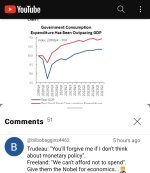
Prime Minister Justin Trudeau publicly renewed his government's focus on these two issues after the Liberal caucus retreat in London, Ont., in September at the end of a rough summer for the party that saw the Conservatives surging in the polls.
The Canadian Housing and Mortgage Corp. estimates Canada needs to build 5.8 million homes by 2030 to restore affordability, a goal that economists at CMHC have conceded will be very difficult to achieve.
Richter said the federal government's window of opportunity to tackle the crisis is closing.
Cost-of-living issues have dominated federal politics as the rapid rise in inflation was followed by historic interest rate hikes from the Bank of Canada.
Both mortgage interest costs and rent prices have risen dramatically. These conditions have made it even harder for low-income Canadians to make ends meet and advocates have been warning about people being pushed into homelessness.
The federal government is facing calls to restrain spending in order to avoid fuelling inflation and to help the Bank of Canada reduce interest rates faster.
Freeland to present fall fiscal update Tuesday as cost-of-living dominates politics — The Canadian Press
OTTAWA - Finance Minister Chrystia Freeland will table the fall fiscal update on Tuesday, which is expected to focus on housing and affordability as the Liberal government struggles to regain favour with Canadians feeling overwhelmed and angry about the rising cost of living.

Mini-Budget update day tomorrow…
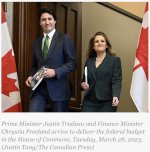
In the federal government’s 2023 fall economic statement, to be presented by Chrystia Freeland in the House of Commons on Tuesday, we will undoubtedly be told of the Liberals’ efficacious fiscal management and the wonderful economic results their policies have produced.
But Canadians are suffering an economic crisis of unaffordability, the worst decade of growth since the Great Depression, a public sector rapidly rising in cost and notable for its inefficiency, a multitude of regulatory initiatives impoverishing consumers and the businesses who serve them, and haphazard taxation and threats of taxation to top it all off.
On Friday, Justin Trudeau made the patently crackpot declaration that his government has “always exercised fiscal restraint.” In fact, they never have. When the Liberals were elected in 2015, the budget was balanced; they promptly threw it into deficit and even before the pandemic began, overspent the fiscal plan they inherited by $127 billion over four and a half years.

 apple.news
apple.news
In a recent Angus Reid Institute survey, Canadians were asked which political party they would prefer to manage the country’s climate change file. The winner was the Conservative Party of Canada; 28 per cent wanted the Tories, against 14 per cent who wanted the Liberal status quo.
But under Poilievre, there are no emissions targets and and he hasn’t released a climate change strategy. The party’s chief issue is abolishing the carbon tax, and whenever someone asks what policy will replace it, the Tory answer is “technology.”
“Small modular nuclear reactors, hydroelectric dams, tidal wave power and other emissions-free energy … get the government out of the way and speed up approvals to green-light green projects,” said Poilievre earlier this month.

 apple.news
apple.news
As to what’s changed in the last eight years, the main reason is likely that the country has been blindsided by a suite of affordability crises. Rent has reached all-time highs — and is still surging by an average of $175 per month. All the while, wages have been in decline for years and are on course for 40 years of sustained stagnation.
Now, when Canadians are asked to rank their top concerns, the top spot is a duel between “economy” and “cost of living” — with climate change lucky if it can crack the top five.
The annual inflation rate has cooled from last year’s highs but remained at 3.8 per cent in the latest reading, with grocery costs still rising above that pace. Much of what’s driving up the cost of living today are mortgage payments, with Canadians renewing into higher interest rates from the Bank of Canada.

 apple.news
apple.news

In the federal government’s 2023 fall economic statement, to be presented by Chrystia Freeland in the House of Commons on Tuesday, we will undoubtedly be told of the Liberals’ efficacious fiscal management and the wonderful economic results their policies have produced.
But Canadians are suffering an economic crisis of unaffordability, the worst decade of growth since the Great Depression, a public sector rapidly rising in cost and notable for its inefficiency, a multitude of regulatory initiatives impoverishing consumers and the businesses who serve them, and haphazard taxation and threats of taxation to top it all off.
On Friday, Justin Trudeau made the patently crackpot declaration that his government has “always exercised fiscal restraint.” In fact, they never have. When the Liberals were elected in 2015, the budget was balanced; they promptly threw it into deficit and even before the pandemic began, overspent the fiscal plan they inherited by $127 billion over four and a half years.
Matthew Lau: Trudeau Liberals economic update will make the bad even uglier — National Post
The government has spent and regulated the country into ruin
In a recent Angus Reid Institute survey, Canadians were asked which political party they would prefer to manage the country’s climate change file. The winner was the Conservative Party of Canada; 28 per cent wanted the Tories, against 14 per cent who wanted the Liberal status quo.
But under Poilievre, there are no emissions targets and and he hasn’t released a climate change strategy. The party’s chief issue is abolishing the carbon tax, and whenever someone asks what policy will replace it, the Tory answer is “technology.”
“Small modular nuclear reactors, hydroelectric dams, tidal wave power and other emissions-free energy … get the government out of the way and speed up approvals to green-light green projects,” said Poilievre earlier this month.
FIRST READING: Canadians appear to have stopped caring about climate change — National Post
Once a critical factor in elections, polls now show Canadians just want to be able to afford things
As to what’s changed in the last eight years, the main reason is likely that the country has been blindsided by a suite of affordability crises. Rent has reached all-time highs — and is still surging by an average of $175 per month. All the while, wages have been in decline for years and are on course for 40 years of sustained stagnation.
Now, when Canadians are asked to rank their top concerns, the top spot is a duel between “economy” and “cost of living” — with climate change lucky if it can crack the top five.
The annual inflation rate has cooled from last year’s highs but remained at 3.8 per cent in the latest reading, with grocery costs still rising above that pace. Much of what’s driving up the cost of living today are mortgage payments, with Canadians renewing into higher interest rates from the Bank of Canada.
Liberals are 'running out of time' heading into fall economic update. Here's why — Global News
The Liberal government is caught between a slowing economy and a need to reverse its political fortunes with voters heading into the fall economic statement.
Police in Windsor, Ont., say they are expecting around 1,600 South Koreans to arrive to work on the town’s new electric-vehicle battery plant, which was heralded by the federal government as a major employer of Canadians? Interesting…You may have heard that the Canadian and Ontario governments are spending up to $15 billion to ensure Chrysler-maker Stellantis builds an electric battery plant in Windsor. From this news, it might be reasonable to conclude that Stellantis is in the business of making batteries, but that would be incorrect. It is quite clear that Stellantis is, instead, in the business of securing government subsidies.
Only a year ago, Stellantis agreed to a deal that included, reportedly, $1 billion from the provincial and federal governments. After the Americans passed Joe Biden’s US$370-billion climate change plan to pour out enormous subsidies and tax credits to attract makers of “green” technology, Stellantis resorted to bald extortion to get a deal worth 15 times as much as the original from Ottawa.
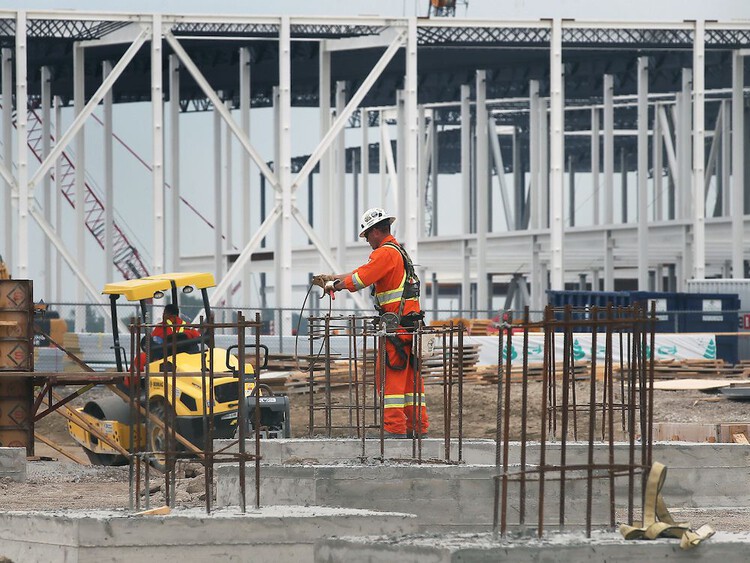
Carson Jerema: Trudeau Liberals were the perfect mark for electric vehicle grifters — National Post
If Stellantis was driven by market forces, it wouldn't need government incentives to the tune of $6 million a jobapple.news
As currently constructed, the Stellantis deal assumes a 10-year term, and is dependent on the production and sale of electric batteries, but what happens if the plant takes longer to build, or it takes longer to get production to expected levels? Or the demand for electric vehicles just isn’t there? Or, what happens when Washington increases funding again?
Just because this deal was signed, doesn’t mean Stellantis, or Volkswagen for that matter, won’t come back a few years from now, demanding more subsidies, or lower production and employment expectations.
All new vehicles sold in Canada must be electric within the next 10 or 15 years, as Ottawa, Washington and others edge closer and closer to outlawing the internal combustion engine outright. Electric vehicles will be the only option on offer.
Getting into the subsidy business is lucrative for manufacturers, not so much for taxpayers.
Unions have seized on a tweet by the Windsor Police Service last Thursday, the week when South Korean diplomatic staff, including an economic attaché from the Ottawa embassy, visited the city for discussions about the factory.
“With the new LG Energy Solutions battery plant being built, we expect approximately 1,600 South Koreans traveling to work and live in our community in 2024,” Windsor police posted on X.
Windsor police say they expect 1,600 Koreans to work at EV battery plant — The Globe and Mail
Pierre Poilievre calls on Ottawa to make the contract with Stellantis and South Korean battery maker LG Energy Solution public
If we are investing in this plant I am sure it was not with the understanding that it was to employ Koreans.
Did ya think Millenials and and Gen X have to fiber to work heavy industry? We have a housing crisis because we don't have builders. A retired Red Seal Carpenter can make $45 an hour sitting in a shack watching TV just to legally be on site for 6 Hondurans getting their apprenticeship.If we are investing in this plant I am sure it was not with the understanding that it was to employ Koreans.
North American youth is fucking useless. Do you think they have a clue on how to set up a factory?
So um where do Canadian jobs come into the picture? Doesn't sound promising...Police in Windsor, Ont., say they are expecting around 1,600 South Koreans to arrive to work on the town’s new electric-vehicle battery plant, which was heralded by the federal government as a major employer of Canadians? Interesting…
Unions have seized on a tweet by the Windsor Police Service last Thursday, the week when South Korean diplomatic staff, including an economic attaché from the Ottawa embassy, visited the city for discussions about the factory.
“With the new LG Energy Solutions battery plant being built, we expect approximately 1,600 South Koreans traveling to work and live in our community in 2024,” Windsor police posted on X.
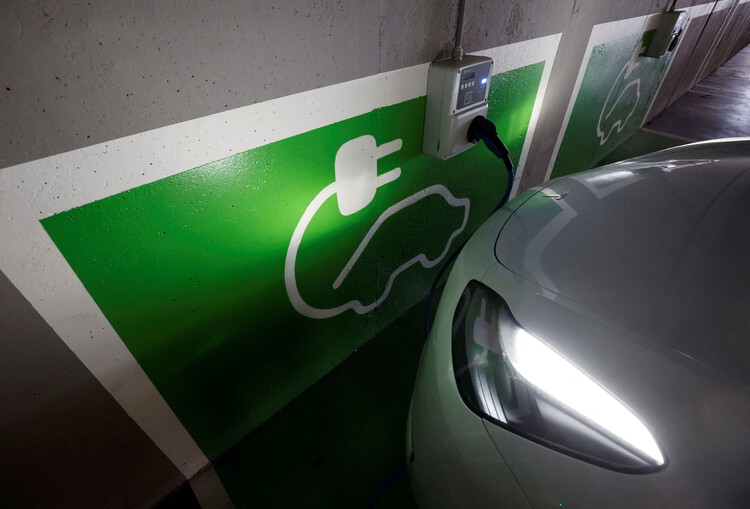
Windsor police say they expect 1,600 Koreans to work at EV battery plant — The Globe and Mail
Pierre Poilievre calls on Ottawa to make the contract with Stellantis and South Korean battery maker LG Energy Solution publicapple.news
Who is going to work them? The aborted kids or non-aborted immigrants?So um where do Canadian jobs come into the picture? Doesn't sound promising...
Holy Crap, shame this wasn’t their goal 8+ years ago…The Liberal government's fall economic statement acknowledges the cost-of-living crisis weighing on Canadians but offers few new measures to tackle it while pledging to keep deficits in check.
But it’s their goal now because it’s 2015-ish??

 apple.news
Guard rails now, after this current government has wracked up more debt than every other government in the history of Canada combined, so far….wow…OK.
apple.news
Guard rails now, after this current government has wracked up more debt than every other government in the history of Canada combined, so far….wow…OK.
At a time when the Liberals are facing pointed criticism from the Opposition Conservatives for years of deficit spending, the update outlines new guardrails to demonstrate fiscal restraint.
That includes setting a goal to keep deficits below one per cent of the GDP beginning in 2026-27???
I don’t pretend to be a mathematician, but I believe 2026-27 comes somewhere after October of 2025.
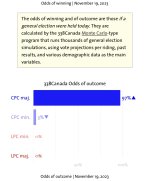
Isn’t that coincidental?
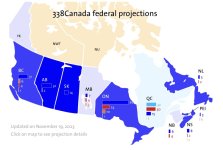
But it’s their goal now because it’s 2015-ish??
Freeland's fiscal update pledges new guardrails to keep deficits in check — The Canadian Press
OTTAWA - The Liberal government's fall economic statement acknowledges the cost-of-living crisis weighing on Canadians but offers few new measures to tackle it, while pledging to keep deficits in check.
At a time when the Liberals are facing pointed criticism from the Opposition Conservatives for years of deficit spending, the update outlines new guardrails to demonstrate fiscal restraint.
That includes setting a goal to keep deficits below one per cent of the GDP beginning in 2026-27???
I don’t pretend to be a mathematician, but I believe 2026-27 comes somewhere after October of 2025.

Isn’t that coincidental?

Guardrails? What good are gayrdrails after you already hit the ditch and took out a power pole?Holy Crap, shame this wasn’t their goal 8+ years ago…The Liberal government's fall economic statement acknowledges the cost-of-living crisis weighing on Canadians but offers few new measures to tackle it while pledging to keep deficits in check.
But it’s their goal now because it’s 2015-ish??
Guard rails now, after this current government has wracked up more debt than every other government in the history of Canada combined, so far….wow…OK.
Freeland's fiscal update pledges new guardrails to keep deficits in check — The Canadian Press
OTTAWA - The Liberal government's fall economic statement acknowledges the cost-of-living crisis weighing on Canadians but offers few new measures to tackle it, while pledging to keep deficits in check.apple.news
At a time when the Liberals are facing pointed criticism from the Opposition Conservatives for years of deficit spending, the update outlines new guardrails to demonstrate fiscal restraint.
That includes setting a goal to keep deficits below one per cent of the GDP beginning in 2026-27???
I don’t pretend to be a mathematician, but I believe 2026-27 comes somewhere after October of 2025.
View attachment 20081
Isn’t that coincidental?
View attachment 20082
What good are they after eight or nine years of doing the same thing?…Every year? And then you’re going to put up guard rails in a few years…the year after you stop driving? That’s a more Apt comparison…starting in 2026-27? Ugh…I just hope this is as transparent to everybody else as it is to me.Guardrails? What good are gayrdrails after you already hit the ditch and took out a power pole?
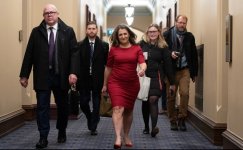
(For some reason, when I see these side-by Hallway Synchronized Waddle Photoshoots, I mentally hear the below theme song playing)
The Liberals are also aiming to maintain the current fiscal year's deficit at or below the spring budget projection of $40.1 billion and lower the debt-to-GDP ratio in 2024-25 relative to the projection in the fall economic statement…which I guess is tightening the belt to the NDP/Liberals???
"Building a Canada that delivers on the promise of the greatest country in the world will be our work for these next two years — and beyond," Freeland said, according to prepared remarks.
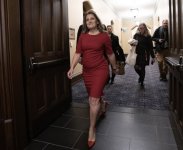
The update adds $20.8 billion in new spending since the spring budget over five years, with some new measures designed to boost the housing supply, including rental units and affordable housing.
But much of the new spending is tied to policies and programs the federal government announced before Tuesday's fall economic statement, including billions of dollars for electric-vehicle battery plants.
…& I hope the 40 million citizens of Canada have their eyes wide open on or before October 2025.It's all on Singh.
Finance Minister Chrystia Freeland’s fall economic statement on Tuesday exposed a federal government that is bleeding red ink that taxpayers will be paying for generations to come.
Caught off guard by rising interest rates, the Trudeau government — meaning taxpayers — will pay $46.5 billion in interest on the federal debt of more than $1.21 trillion this year, almost 33% higher compared to $35 billion last year, on its way to a staggering $60.7 billion in 2028.
The $46.5 billion Canadians will pay in interest on the federal debt this year won’t go to programs to improve the lives of Canadians, nor will it lower the debt. It’s just paying interest on the debt. Singh is, with his Non-coalition coalition in the NDP/Liberal Party….what’s keeping Trudeau in power for more than the last year, and potentially the next two years…
EDITORIAL: Liberal debt bomb explodes on taxpayers — Toronto Sun
Finance Minister Chrystia Freeland’s fall economic statement on Tuesday exposed a federal government that is bleeding red ink that taxpayers will be paying for generations to come. Caught off guard by rising interest rates, the Trudeau government — meaning taxpayers — will pay $46.5 billion in...
It's in Singh's best interest you pull the plug. Numbers have him as opposition leader if we hit the polls. Today could be the non-confidence vote we've been waiting for.…& I hope the 40 million citizens of Canada have their eyes wide open on or before October 2025.
Finance Minister Chrystia Freeland’s fall economic statement on Tuesday exposed a federal government that is bleeding red ink that taxpayers will be paying for generations to come.
Caught off guard by rising interest rates, the Trudeau government — meaning taxpayers — will pay $46.5 billion in interest on the federal debt of more than $1.21 trillion this year, almost 33% higher compared to $35 billion last year, on its way to a staggering $60.7 billion in 2028.
The $46.5 billion Canadians will pay in interest on the federal debt this year won’t go to programs to improve the lives of Canadians, nor will it lower the debt. It’s just paying interest on the debt. Singh is, with his Non-coalition coalition in the NDP/Liberal Party….what’s keeping Trudeau in power for more than the last year, and potentially the next two years…

EDITORIAL: Liberal debt bomb explodes on taxpayers — Toronto Sun
Finance Minister Chrystia Freeland’s fall economic statement on Tuesday exposed a federal government that is bleeding red ink that taxpayers will be paying for generations to come. Caught off guard by rising interest rates, the Trudeau government — meaning taxpayers — will pay $46.5 billion in...apple.news